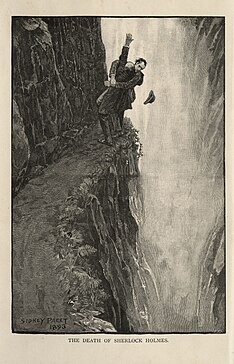During the decade of the 1890s several murder cases captured the public's imagination to compete for the title of the crime of the century. Many of the most notorious are relatively forgotten, including Eleanor Pearcy, Amelia Dyer and Joseph Vacher.
Some are still well-remembered: the killing of the parents of Lizzie Borden; the murderous career of Dr. Thomas Neill Cream and the infamy of Dr. Henry H. Holmes.
One newspaper article which catalogued these names, now seems cryptic. ". . . [Since Lizzie Borden,] remarkable murder trials in the United States have been multiplying at a rapid rate. New York contributed two celebrated cases--Carlyle W. Harris and Dr. Buchanan, both within two years. Then came the Durrant case in San Francisco, and the Holmes case here. The trial of the actor Gentry for the murder of Madge York will also prove notable in criminal annals." [Philadelphia Inquirer, November 3, 1895, p. 6]
One crime, however, had the whole world talking about it. As was first reported in the December, 1893 edition of The Strand Magazine, Dr. Moriarty and by extension, the author Arthur Conan Doyle, had killed Sherlock Holmes.
Never had such a cruel or more wanton act of literary savagery ever been conceived of and enacted upon. While within novels, heroes died noble, tragic deaths, authors did not kill off their popular creations that had survived so many dangers, for Holmes, at that time, twenty-six adventures.
Having debuted a mere six years back, Sherlock Holmes was internationally famous and well-loved. Chiefly as a result of Sherlock's success, Arthur Conan Doyle popularity had reached that of Kipling, Stevenson, and Hardy. Considering the pay given to the author, it seemed to be an act of financial suicide.
Holmes's death inspired obituaries.
DEATH OF SHERLOCK HOLMES.
Sherlock Holmes is no more. He dies with his name ringing in men's ears. The police of the world are left with their inferior resources to deal with crime as of old. [South Wales Daily News, December 14, 1893]
As for the murderer? Dr. Arthur Conan Doyle claimed justifiable homicide.
"I have come to take you in custody for the killing of Sherlock Holmes," I [the reporter] said, as soon as we were seated.
"Ah, but I did it in self defense," he [Conan Doyle] replied. "And if you knew the provocation you would agree with me that it was justifiable homicide. When I invented this character I had no idea he would give me so much trouble. But when Holmes' Adventures began to appear in the Strand Magazine, its circulation went up by leaps and bounds until it reached the phenomenal figure of 400,000. No sooner had one story appeared than I was set upon for another, and such considerable sums of money were offered by the publisher, indicating a popular demand so imperative and so flattering, that I was tempted repeatedly from other work which I greatly desired to finish. I went on from one case to another until, as you know, there are now two volumes of "The Memoirs and Adventures of Sherlock Holmes." At last I killed him, and I had not done so I almost think he would have killed me." [The Press, New York. June 10, 1894, Part IV, p. 1]
The press accused him of murder by melodrama.
"Is it the artistic termination to a career like that of Sherlock Holmes . . . he should topple into "a boiling pit of incalculable depth" formed by raging waters beneath? I think not. [A Great Detective. The Leeds Times, December 16, 1893, p. 4]
"The truth is that Dr. Doyle's ingenuity, so brilliantly exemplified in many a story of adventure, has proved unequal to the final catastrophe of his hero." [Exit Sherlock Holmes, Guernsey Star, December 21, 1893, p. 1]
The killer showed some remorse:
"Yes, it is a case of cold-blooded murder," said Dr. A. Conan Doyle, in conversation with a Post reporter at the Burnet House, "and when I killed Sherlock Holmes I killed my best friend." [Pen Picture, The Cincinnati Post, October 17, 1894, p. 2]
The Ghost.
The career of Sherlock Holmes did not need to wait for his resurrection in order to continue. A popular song of the day had the ghost of Holmes solving crimes.
Sinners shake and tremble
Wherever this bogie roams,
And people shout, 'He's found us out,
It's the ghost of Sherlock Holmes'
The man who plots a murder, when
He sees me flit ahead,
Forgets to murder anyone,
And 'suicides' instead.
An anarchist with lighted bomb
To cause explosive scenes,
Sees me and drops the bomb, and blows
Himself to smithereens!
From: The Ghost of Sherlock Holmes, Richard Morton (lyricist of Tra-la-la Boom-de-Ay).
 | |||
| Sherlock Holmes fighting Moriarty at the brink of Reichenbach Falls. Sidney Paget, illustrator. |
Nikola Tesla, Arthur Conan Doyle and Dr. Henry H. Holmes are all characters in my thriller, A Predator's Game.
A Predator's Game is available in soft-cover and ebook through Amazon and other online retailers.
A Predator's Game, now available, Rook's Page Publishing.
-----------------------
Back page blurb.
Manhattan, 1896.
When the author Arthur Conan Doyle meets Nikola Tesla he finds a tall, thin genius with a photographic memory and a keen eye, and recognizes in the eccentric inventor the embodiment of his creation, Sherlock. Together, they team up to take on an "evil Holmes." Multi-murderer Dr. Henry H. Holmes has escaped execution and is unleashing a reign of terror upon the metropolis. Set in the late nineteenth century in a world of modern marvels, danger and invention, Conan Doyle and Tesla engage the madman in a deadly game of wits.
Martin Hill Ortiz, also writing under the name, Martin Hill, is the author of A Predatory Mind. Its sequel, set in 1890s Manhattan and titled A Predator's Game, features Nikola Tesla as detective.

No comments:
Post a Comment